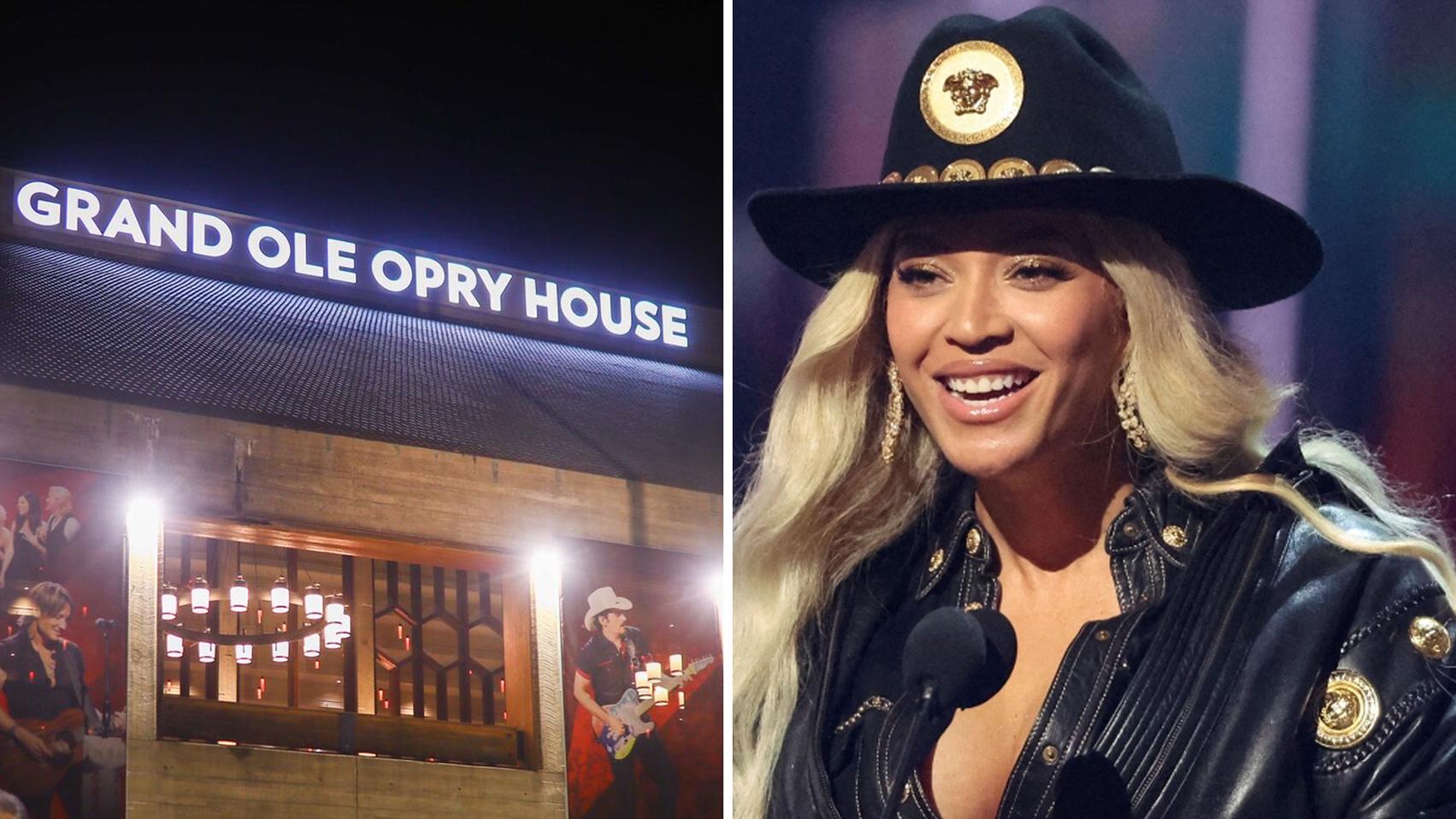
In a surprising and polarizing move, the Grand Ole Opry has announced that global music icon Beyoncé has been banned for life from performing at the iconic venue. The decision comes amidst a wave of criticism and debate over the boundaries of country music and the representation of diverse musical styles within the genre. Let’s delve into the details of this controversial ban and the broader implications it raises for the country music industry.
The Grand Ole Opry, located in Nashville, Tennessee, has long been considered a bastion of traditional country music, showcasing legendary performers and upholding the genre’s rich heritage. Established in 1925, the Opry has served as a platform for country music’s biggest stars, from Johnny Cash to Dolly Parton.
However, the decision to ban Beyoncé, one of the most successful and influential artists of our time, has ignited a firestorm of debate within the music community. The controversy stems from remarks reportedly made by Opry officials, citing Beyoncé’s musical style and image as incompatible with the Opry’s definition of country music.
According to sources close to the situation, the ban was prompted by Beyoncé’s recent foray into country music with her song “Daddy Lessons,” featured on her critically acclaimed album “Lemonade.” The track, which incorporates elements of country, blues, and hip-hop, received praise for its genre-bending approach but also drew criticism from traditionalists within the country music scene.
 The decision to ban Beyoncé has been met with mixed reactions from fans, artists, and industry insiders alike. Supporters of the ban argue that the Grand Ole Opry has a responsibility to uphold the integrity of country music and preserve its authenticity. They contend that Beyoncé’s crossover into the genre represents a dilution of its traditional roots.
The decision to ban Beyoncé has been met with mixed reactions from fans, artists, and industry insiders alike. Supporters of the ban argue that the Grand Ole Opry has a responsibility to uphold the integrity of country music and preserve its authenticity. They contend that Beyoncé’s crossover into the genre represents a dilution of its traditional roots.
 Conversely, critics view the ban as a regressive and exclusionary move that perpetuates narrow definitions of what constitutes country music. They argue that music genres are fluid and should evolve with changing times and cultural influences. Beyoncé’s exploration of country music, they argue, reflects the genre’s ability to transcend boundaries and reach diverse audiences.
Conversely, critics view the ban as a regressive and exclusionary move that perpetuates narrow definitions of what constitutes country music. They argue that music genres are fluid and should evolve with changing times and cultural influences. Beyoncé’s exploration of country music, they argue, reflects the genre’s ability to transcend boundaries and reach diverse audiences.
 The controversy also raises broader questions about diversity and representation within the country music industry. Historically, country music has been criticized for its lack of inclusivity and underrepresentation of artists of color. Beyoncé’s ban from the Grand Ole Opry highlights these ongoing disparities and challenges facing minority artists in the genre.
The controversy also raises broader questions about diversity and representation within the country music industry. Historically, country music has been criticized for its lack of inclusivity and underrepresentation of artists of color. Beyoncé’s ban from the Grand Ole Opry highlights these ongoing disparities and challenges facing minority artists in the genre.
 In response to the ban, Beyoncé’s representatives have issued a statement expressing disappointment and highlighting the importance of embracing diversity in music. They argue that Beyoncé’s contributions to country music are a celebration of its rich heritage and a testament to its universal appeal.
In response to the ban, Beyoncé’s representatives have issued a statement expressing disappointment and highlighting the importance of embracing diversity in music. They argue that Beyoncé’s contributions to country music are a celebration of its rich heritage and a testament to its universal appeal.
The Grand Ole Opry’s decision to ban Beyoncé underscores the tension between tradition and innovation in the music industry. As genres continue to evolve and artists push creative boundaries, institutions like the Opry face the challenge of balancing historical legacy with contemporary sensibilities.
 Critics of the ban point to the evolving landscape of country music, which has seen a resurgence of diverse voices and styles in recent years. Artists like Lil Nas X, Mickey Guyton, and Kane Brown have challenged stereotypes and expanded the genre’s reach, paving the way for greater inclusivity and artistic experimentation.
Critics of the ban point to the evolving landscape of country music, which has seen a resurgence of diverse voices and styles in recent years. Artists like Lil Nas X, Mickey Guyton, and Kane Brown have challenged stereotypes and expanded the genre’s reach, paving the way for greater inclusivity and artistic experimentation.
The controversy surrounding Beyoncé’s ban also reflects broader cultural debates around identity and representation. In an era marked by heightened awareness of social justice issues, the music industry is under increasing scrutiny to address systemic inequities and foster greater diversity.
As discussions around Beyoncé’s ban continue to unfold, many are calling for a reevaluation of how country music defines itself and welcomes new voices. The Grand Ole Opry’s decision has sparked conversations about the need for inclusivity and openness within the genre, encouraging a more expansive view of what country music can be.
In conclusion, the Grand Ole Opry’s lifetime ban on Beyoncé has ignited a passionate debate about the nature of country music and the evolving landscape of the music industry. The controversy underscores the challenges of balancing tradition with innovation and highlights the ongoing need for greater diversity and representation within country music. As artists continue to push boundaries and challenge conventions, the future of the genre remains as dynamic and diverse as the artists who define it.
News
Thomas Markle ‘so sad’ he won’t join Prince Harry and Meghan Markle for special occasion
Thomas Markle has been estranged from his youngest daughter Meghan Markle since shortly after her wedding to Prince Harry in 2018. Thomas Markle has never met neither…
Rose Hanbury breaks silence to answer allegations over Prince William affair
There have been an untold number of well-publicized royal scandals over the years, many points in history where the ongoings of the British monarchy have dominated newspaper…
Netflix CEO Snubs Sussexes’ $100 Million Deal: Meghan Markle Faces Rejection from Streaming Giants
SO, BACK IN 2020, MEGXIT HAPPENED. HARRY AND MEGHAN DECIDED TO STEP BACK FROM ROYAL DUTIES, CITING PRIVACY CONCERNS AND A DESIRE FOR INDEPEN… So, back in…
Man Claiming to Be King Charles & Queen Camilla’s Son Speaks Out on DNA Test — Details & His Photos
An Australian’s quest for royal recognition takes a dramatic turn, with a plan to compare DNA with a royal family member at the center. Amidst a backdrop…
Prince Harry and Meghan Markle reportedly face their titles being STRIPPED with the Royal Family’s silent approval
The Palace has be warned that a potential move could spark backlash from the public if it’s given the go ahead. A royal expert has claimed that…
Meghan Markle thinks Prince Harry is making ‘big mistake’ by reaching out to Princess Kate
Meghan Markle is reportedly worried about Prince Harry attempting to reunite with his sister-in-law, Princess Kate, following the news of her cancer diagnosis, as he prepares for…
End of content
No more pages to load





